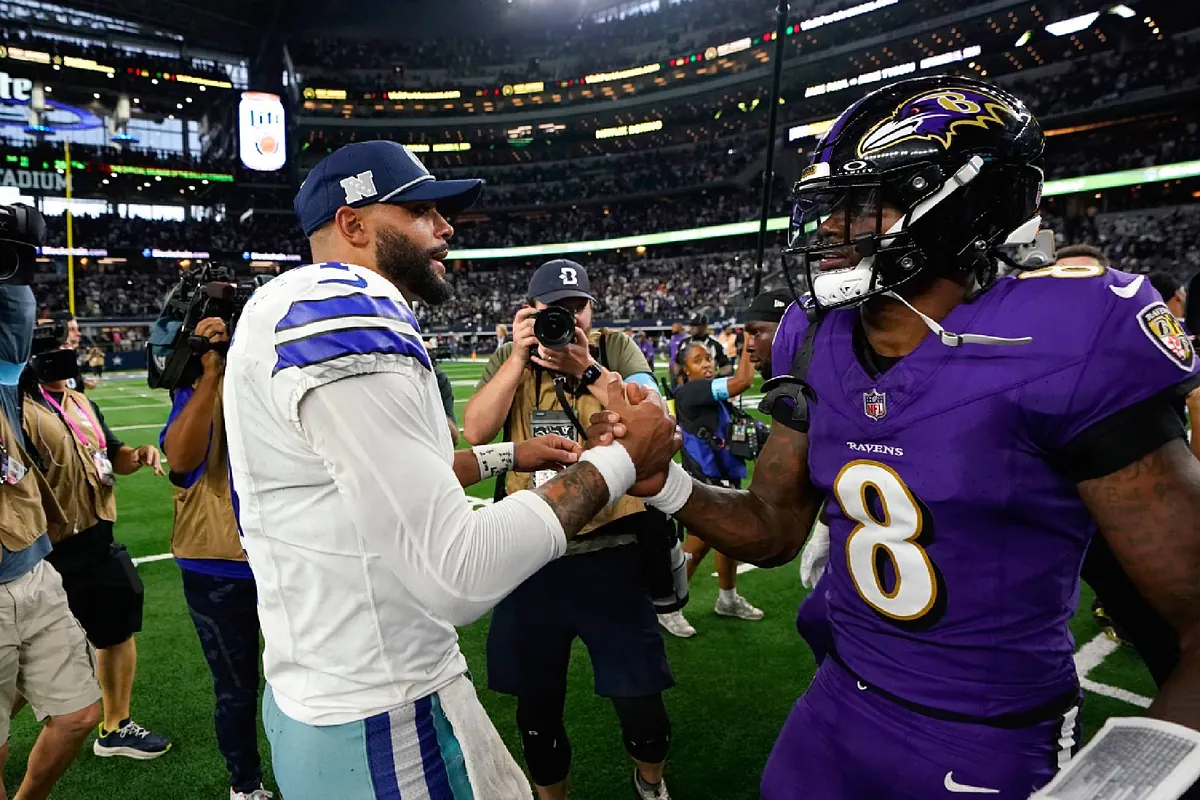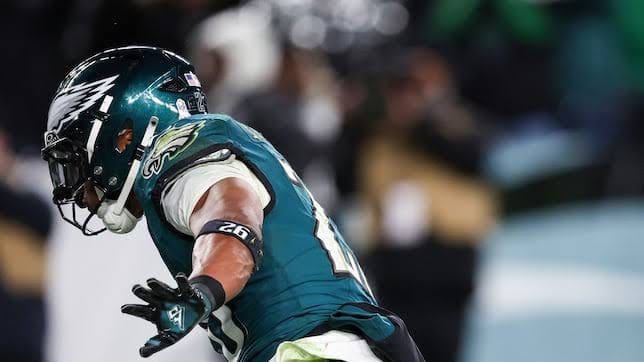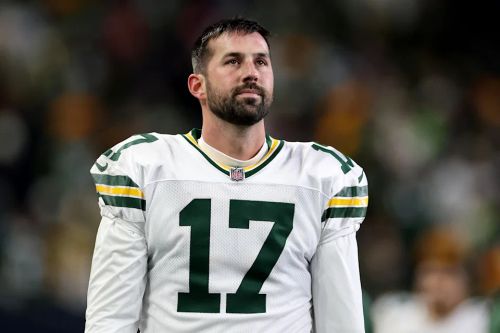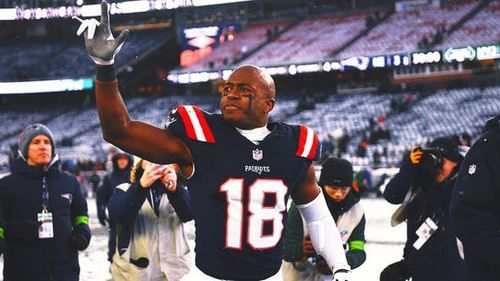Another strong message has been sent—one that doesn’t need to be spoken aloud or pushed through press conferences. Lamar Jackson and the Baltimore Ravens are making their presence felt once again in a way that should be ringing in Dak Prescott’s ears from hundreds of miles away. The message isn’t just about football. It’s about money, timing, leverage, and the shifting tectonics of quarterback contracts in the NFL. As Jackson continues to solidify his place among the league’s elite while also living out the financial rewards of his bold negotiation tactics, the ripple effect is now staring down Prescott and the Dallas Cowboys organization in ways that could define the next five years of the franchise’s future.
Jackson’s journey to his massive payday was unlike most. He famously represented himself in negotiations and turned down multiple offers before finally securing a five-year, \$260 million contract with \$185 million guaranteed. That deal sent a powerful signal—not only to other quarterbacks looking to get paid but also to NFL franchises who had hoped to maintain some degree of cost control in an era where quarterback salaries are ballooning beyond belief. More than anything, Jackson proved that if you bet on yourself and back it up with MVP-caliber play, the money will come, even if you have to wait for it.
Prescott, meanwhile, finds himself in a curious and precarious position. On the one hand, he is coming off one of the most statistically impressive seasons of his career, having led the NFL in touchdown passes during the 2023 regular season and playing a key role in the Cowboys’ 12-win campaign. On the other, the shadow of postseason disappointment continues to loom over his legacy in Dallas. The Cowboys haven’t sniffed a Super Bowl appearance since the mid-1990s, and fair or not, Prescott shoulders much of the blame every time January ends in heartbreak for “America’s Team.”
The real tension lies in the financial timing. Prescott is entering the final year of his deal with Dallas, a contract that already pays him \$40 million annually. But due to the way it’s structured—combined with no franchise tag clause—the Cowboys are rapidly running out of time and leverage. Prescott holds all the cards. And if the Ravens’ situation with Jackson is any indication, Prescott may be about to play his hand in a way that could net him a contract worth north of \$55 million per year.
Jackson’s deal reset the market when it was signed, only to be quickly surpassed by Justin Herbert and Joe Burrow. Now, with Trevor Lawrence reportedly nearing a massive extension of his own, the quarterback market is once again on the rise. Every new deal pushes the ceiling higher, and Prescott’s situation is tailor-made to take advantage of it. There’s no young quarterback waiting in the wings in Dallas. There’s no backup plan. And most importantly, there’s no time left for games.
Prescott can look at Jackson and see a mirror of self-confidence and patience paying off. Jackson’s willingness to reject early offers, even while enduring public criticism and doubt, ultimately led to him becoming one of the highest-paid players in league history. It’s a blueprint Prescott would be wise to follow. If he holds firm, avoids early extensions, and plays through the 2025 season while staying healthy and productive, he could become the next quarterback to shake the financial foundation of the league.
And it’s not just about personal wealth. These kinds of deals ripple through locker rooms, cap tables, and front office strategies. When Jackson got paid, it forced the Ravens to reconfigure how they approached roster building. It demanded greater investment in pass-catching talent, an improved offensive line, and long-term continuity for an offense tailored to his skills. That pressure will soon be on the Cowboys. If they decide to lock in Prescott for five more years at a potential \$275-300 million price tag, it will force some tough choices about the supporting cast. Can they afford to pay CeeDee Lamb top-tier receiver money? What about Micah Parsons, who is likely to command one of the largest contracts ever for a defensive player?
Jackson’s strong message wasn’t just financial. It was philosophical. He demanded not only compensation but respect for his value as the face of a franchise. He believed in his style of play, believed in his ability to lead, and convinced the Ravens to structure an organization around that vision. Prescott, despite being doubted at times, carries similar value to Dallas. He is a face-of-the-franchise player, a leader in the locker room, and someone who has carried the expectations of an impatient fan base without ever creating controversy or division. If he believes he deserves to be paid like a top-tier quarterback—and all indications suggest he does—he can now lean on Jackson’s story as validation.
The conversation around Prescott has always been complicated. He doesn’t have the arm talent of Patrick Mahomes or the highlight reel of Josh Allen. He doesn’t have the rushing explosiveness of Jackson or the jaw-dropping stats of Burrow. But what he does have is consistency, leadership, durability, and the respect of teammates. In a league desperate for steady quarterback play, that’s worth more than ever. It’s also worth, quite literally, millions.
The Cowboys, however, find themselves in a bind. Extend Prescott now, and they may have to overpay on the front end to avoid being completely gutted by free agency in future seasons. Let him walk, and they risk plunging into quarterback purgatory—a place where no team wants to be. The Ravens faced a similar fork in the road. Letting Jackson leave would have sent them into a rebuild. Instead, they paid their quarterback, recalibrated their team-building approach, and gave him the tools to compete. That approach is already yielding results.
There’s also an unspoken challenge here—an arms race among quarterbacks not just for rings but for respect. Every contract sends a message about where a player stands in the hierarchy of the league. When Jackson signed his deal, it wasn’t just about money—it was about recognition. Prescott’s next contract could carry the same weight. He wants to be seen in the same light as his peers who’ve been rewarded for their production. And after watching Daniel Jones land \$40 million per year, there’s no way Prescott’s camp will settle for less than being among the top three to five earners at the position.
What complicates matters further is the Cowboys’ notorious hesitancy with contract negotiations. Jerry Jones has made a habit of dragging out deals, whether with Dez Bryant, Ezekiel Elliott, or even Prescott himself during the last negotiation cycle. But this time, the consequences could be even more severe. The lack of a tag clause means the Cowboys have zero fallback. If they wait too long, Prescott can walk away and test the open market—where quarterback-hungry teams like the Raiders, Vikings, or Commanders could throw ungodly sums of money at him.
The Ravens, by contrast, navigated their storm and came out stronger. They sent a message not only to Jackson, but to the rest of the NFL: We will take care of our guy. That kind of trust builds culture, loyalty, and long-term belief. It also shows prospective free agents that the team is serious about competing and investing in winning. The Cowboys must now prove the same. And the clock is ticking.
This situation is about more than just two quarterbacks. It’s about how NFL teams manage their windows, treat their stars, and respond to the realities of a cap-strapped league. Jackson’s journey changed the rules of engagement. Prescott is now at the same crossroads, staring down the possibility of another record-setting deal, another reshaping of a team’s future, and another moment where silence says everything.
The Ravens sent their message loud and clear: believe in your quarterback and pay him what he’s worth. Now it’s the Cowboys’ turn. Will they rise to meet that standard or fumble away their best shot at sustained success? Whatever happens, the outcome could translate into hundreds of millions—and change the landscape of the NFL once again.



